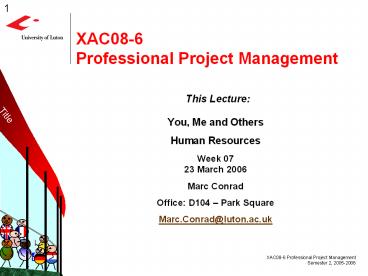XAC08-6%20Professional%20Project%20Management - PowerPoint PPT Presentation
Title:
XAC08-6%20Professional%20Project%20Management
Description:
XAC08-6 Professional Project Management. Semester 2, 2005-2006. Milk. XAC08-6 ... Build trust and establish good working relationships. ... – PowerPoint PPT presentation
Number of Views:60
Avg rating:3.0/5.0
Title: XAC08-6%20Professional%20Project%20Management
1
XAC08-6Professional Project Management
- This Lecture
- You, Me and Others
- Human Resources
- Week 07
- 23 March 2006
- Marc Conrad
- Office D104 Park Square
- Marc.Conrad_at_luton.ac.uk
Title
2
Roles and Responsibilities
- Project Sponsor
- the one with the money
- Senior Management
- e.g. priorities between projects, project charter
- Team
- Does Planning and Execution
- Functional Manager
- owns resources (IT, marketing, etc.)
- Project Manager
- The individual responsible for the project
- Other Stakeholders
- Customer, external experts,
3
Organizational Culture and Structure Functional
Manager (FM) vs. Project Manager (PM)
- Functional organization (hierarchical model)
- PM and FM must coordinate needs regarding
resources - Matrix organization
- Shared direction of work
- Projectized organization
- Direction of work is by PM
- Consider
- Level of authority
- Communication methods
- Staff management techniques
4
Organization Models and Project Managers Role
Level of authority Communication methods Staff management techniques
Functional (hierarchical) Low Horizontal flow of information is difficult Well defined
Matrix organization Medium Good information flow May become problematic (two bosses)
Projectized organisation High Excellent conditions Demanding (uncertainty of after the project)
5
PRINCE2 Management Structure
Corporate Management
Project Board consisting of Senior User,
Executive, Senior Supplier supported by Project
Assurance
Project Manager
Project Support Office
Team Manager(s)
- see for details, e.g. http//www.spoce.com/PRINCE2
20P2Introduction.htm
6
PMBOK - Human Resources
- In the knowledge area of Human Resource
Management the following processes are included - Human Resource Planning Identifying and
documenting project roles, responsibilities and
reporting relationships, as well as create the
staffing management plan - Acquire Project Team Obtaining the human
resources needed to complete the project. - Develop Project Team Developing individual and
group competencies to enhance project performance - Manage Project Team Tracking individual and team
performance, provide feedback, resolve issues and
coordinate changes to enhance project performance.
7
Responsibility Assignment Matrix
- Start with WBS and apply people to tasks.
- Various formats exist to document team member
roles and responsibilities, the most common form
is the - Responsibility Assignment Matrix
- For example (from http//www.cvr-it.com, also on
Blackboard) click below
8
What to do with the Team?
- Understand cultural diversity
- Motivate
- Develop
9
Hofstedes Cultural Dimensions
- Geert Hofstede describes culture by five
dimensions - Power Distance Index (PDI)
- Individualism (IDV)
- Masculinity (MAS)
- Uncertainty Avoidance Index (UAI)
- Long-Term Orientation (LTO)
- Details http//www.geert-hofstede.com/
- Apply Hofstede to Individuals
- Project teams may suffer from cultural tensions.
- Culture is not ethnic origin!
10
Motivation How to Motivate People?
- Intrinsic vs. Extrinsic Motivation
- Doing something for enjoyment vs. doing something
for a reward. - Maslows Hierarchy of Needs (1950)
- physiological, safety, social, esteem,
self-actualization - Herzbergs Motivation-Hygiene Theory (1966)
- motivational factors (e.g. recognition) vs.
hygiene factors (e.g. salary) - McGregors Theory X and Theory Y (1960)
- Theory X People dislike and avoid work
- Theory Y Work is natural (as play or rest)
- Well documented on the Internet, see Blackboard
(Learning Resources) for details.
11
Develop Project Team(PMBOK process 27 in file
ito.ppt)
- Two objectives
- Improve the skills of individual team members in
order to increase their ability to complete
project activities. - Improve feelings of trust and cohesiveness among
team members in order to raise productivity
through greater teamwork.
- Tools Techniques
- General management skills
- Training
- Team-building activities
- Ground rules
- Co-location
- Recognition and rewards
12
Develop Project TeamTools Techniques (1)
- General Management Skills
- Soft skills (e.g. ability to solve conflicts).
- Disciplinary actions.
- Training
- E.g. classroom, online, computer-based,
on-the-job training from another project team
member, mentoring, and coaching. - Note that developing skills is part of the
project work.
13
Develop Project TeamTools Techniques (2)
- Team-Building Activities
- Vary from a five-minute agenda item in a statues
review meeting to an off-site, professionally
facilitated experience designed to improve
interpersonal relationships. - Build trust and establish good working
relationships. - Are particularly valuable when team members
operate electronically from remote locations.
14
Develop Project TeamTools Techniques (3)
- Ground Rules
- Establish clear expectations regarding acceptable
behaviour by project team members. - Decreases misunderstandings and increases
productivity. - Co-Location
- Places team members in the same physical
location. - Can be temporary, at strategically important
times during the project. - May include a meeting room (with coffee machine).
15
Develop Project TeamTools Techniques (4)
- Recognition and Rewards
- Award decisions are made during the Manage
Project Team process. - But there are a some pitfalls
- Reward only desirable behaviour (e.g. do not
reward work overtime when this is result of poor
planning). - Win-lose rewards (team member of the month) can
spoil team cohesiveness. - Cultural differences, e.g. team rewards in a
highly individualistic context may be difficult
16
Summary
- There are many different roles in a Project
- Responsibility Assignment Matrix for Planning
- Team Development
- Culture, Motivation, Coherence, Skills































